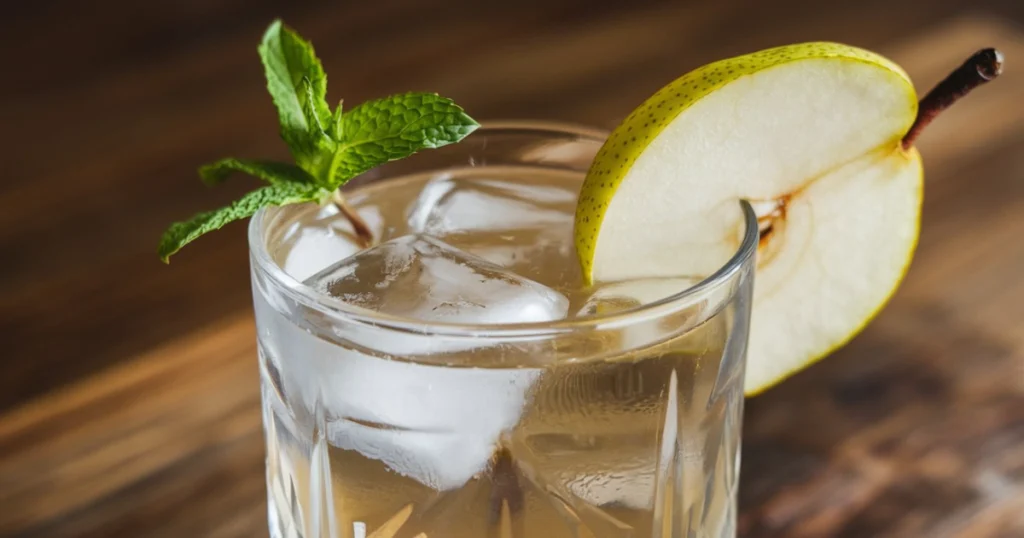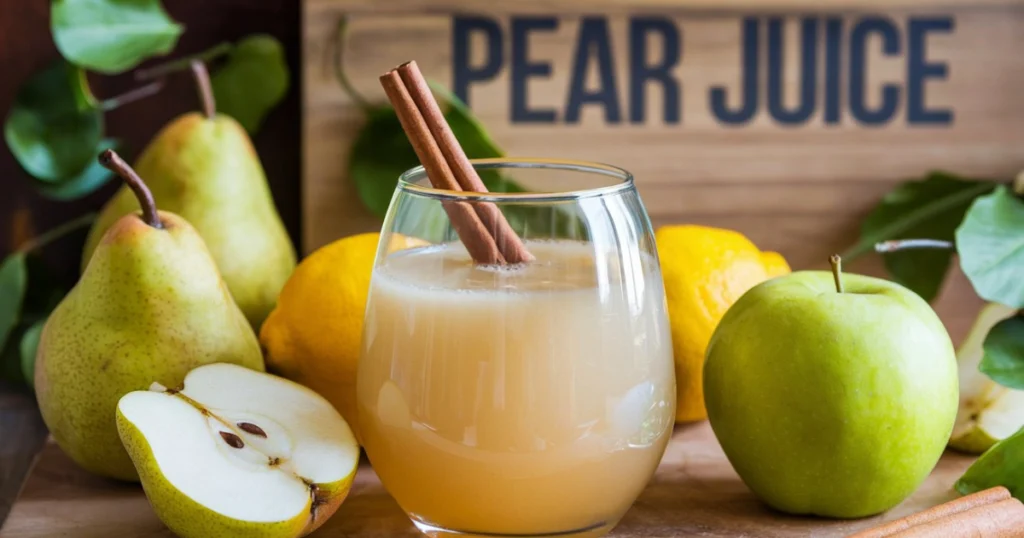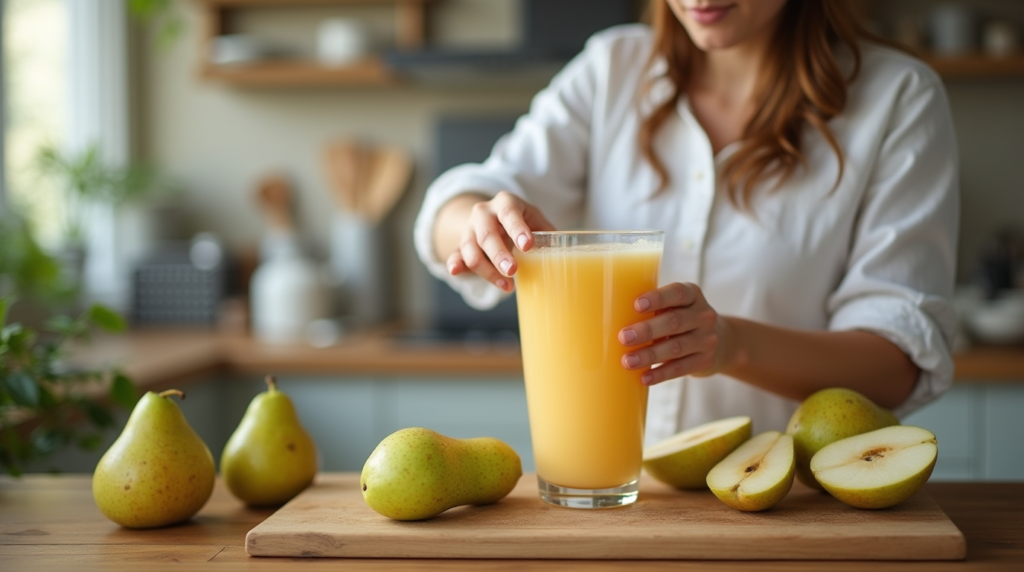Struggling with digestive discomfort or searching for a refreshing, nutrient-packed beverage? Pear juice could be the natural solution you’ve been overlooking. Packed with hydrating properties and gentle on the stomach, this golden elixir isn’t just a drink—it’s a wellness booster. From easing pear juice for constipation to being a safe and effective remedy like pear juice for babies, its benefits are far-reaching.

Imagine a simple pear juice recipe that transforms ripe, juicy fruit into a powerhouse for gut health. For parents, even pear juice for newborn constipation offers a gentle approach to support your little one’s comfort. Whether you’re crafting a classic pears juice recipe or exploring its medicinal perks, pear juice holds the key to natural nourishment and relief. Take a sip, and let its subtle sweetness and digestive magic inspire a healthier you today.
Table of Contents
Understanding Constipation
Constipation is more than just an inconvenience; it’s a sign that your digestive system needs attention. Common causes include low fiber intake, dehydration, and sedentary lifestyles. Symptoms like hard stools, bloating, and discomfort can affect daily life and overall health. Addressing these underlying factors with dietary changes, hydration, and natural remedies like pear juice can restore balance and improve gut function effectively.
Common Causes and Symptoms of Constipation
Constipation occurs when bowel movements become infrequent or difficult to pass. This can be attributed to various factors, including a low-fiber diet, dehydration, lack of physical activity, or even stress. Symptoms often include hard stools, abdominal pain, bloating, and a sensation of incomplete evacuation. Chronic constipation can lead to more severe issues such as hemorrhoids or anal fissures.
How Diet and Hydration Affect Bowel Movements
Diet plays a crucial role in maintaining regularity. A fiber-deficient diet can slow down intestinal motility, making stools harder and more challenging to pass. Similarly, inadequate hydration leads to the absorption of water from the colon, resulting in dry, compacted stools. A well-balanced diet rich in fiber and proper hydration is essential for optimal digestive health.
The Role of Pears in Digestive Health
Pears are a nutritional powerhouse that supports digestive health in multiple ways. High in dietary fiber, they bulk up stools and ease their passage. Pears also contain sorbitol, a natural compound that acts as a mild laxative. Their antioxidants and polyphenols nourish gut bacteria, promoting a balanced microbiome. Incorporating pears into your diet, whether whole or as juice, is a delicious way to maintain a healthy digestive system.
Nutritional Profile of Pears and Their Fiber Content
Pears are a powerhouse of nutrients, containing vitamins C and K, potassium, and antioxidants. Their high dietary fiber content, primarily in the form of insoluble fiber, aids in bulking up stools and promoting regular bowel movements. A medium-sized pear provides about 6 grams of fiber, making it an excellent addition to a constipation-relief diet.
Key Compounds in Pears That Promote Gut Health
Apart from fiber, pears contain sorbitol, a naturally occurring sugar alcohol known for its laxative properties. Sorbitol draws water into the intestines, softening stools and facilitating easier passage. Additionally, pears are rich in polyphenols, which support a healthy gut microbiome by nourishing beneficial bacteria.

Why Pear Juice is Effective for Constipation
Pear juice’s effectiveness lies in its natural composition. Rich in water, it hydrates the body and softens stools. Its fiber content promotes regularity, while sorbitol acts as a gentle laxative by drawing water into the intestines. Unlike harsh laxatives, pear juice works gradually, supporting the body’s natural processes. This combination of hydration, fiber, and sorbitol makes pear juice a reliable remedy for constipation.
High Water Content for Hydration and Digestion
Pear juice is primarily composed of water, which is vital for softening stools and maintaining smooth digestive processes. Hydration is a cornerstone of digestive health, and pear juice offers a dual benefit of moisture and nutrients.
Natural Sorbitol in Pears as a Gentle Laxative
The sorbitol in pear juice acts as an osmotic agent, drawing water into the colon to ease stool passage. Unlike harsh chemical laxatives, sorbitol works gently, making it suitable for individuals of all ages.
How to Prepare Pear Juice for Constipation Relief
Making fresh pear juice is simple and rewarding. Begin with ripe, juicy pears; Bartlett or Anjou varieties work best. Wash and core the pears, keeping the skin on for added fiber if desired. Blend the pieces with a small amount of water until smooth, then strain for clear juice or leave as is for a thicker texture. This homemade remedy is free from additives, ensuring pure and effective relief from constipation.
Step-by-Step Guide to Making Fresh Pear Juice at Home
- Select ripe, juicy pears for optimal sweetness and nutritional content.
- Wash and peel the pears if desired, though keeping the skin adds extra fiber.
- Core the pears and cut them into smaller pieces.
- Blend the pieces with a small amount of water until smooth.
- Strain the mixture for a clear juice or consume it as is for added fiber.
Tips for Selecting the Best Pears for Juicing
Choose varieties like Bartlett or Anjou pears, known for their natural sweetness and juiciness. Ensure the pears are ripe but not overly soft, as this ensures the best flavor and nutrient retention.
Best Practices for Consuming Pear Juice
To maximize the benefits of pear juice for constipation, timing and quantity are key. Drink it in the morning on an empty stomach to kickstart digestion. Limit intake to one or two glasses daily to avoid potential discomfort. Pair pear juice with complementary ingredients, such as ginger or lemon, for enhanced digestive support. Following these best practices ensures that you get the most out of this natural remedy while maintaining overall gut health.
Ideal Times and Quantities for Optimal Results
Drink a glass of pear juice in the morning on an empty stomach to kickstart digestion. Limit consumption to one or two servings daily to avoid potential digestive discomfort from excessive sorbitol intake.
Combining Pear Juice with Other Ingredients for Added Benefits
Enhance the effectiveness of pear juice by blending it with ingredients like ginger, which reduces bloating, or lemon, which boosts digestion. These combinations also add a refreshing twist to the juice.
Comparing Pear Juice to Other Remedies
When it comes to constipation relief, how does pear juice stack up? Compared to prune juice, pear juice offers a milder taste and gentler action, making it suitable for sensitive stomachs. Unlike synthetic laxatives, pear juice is non-habit-forming and supports overall gut health. Its combination of hydration, fiber, and natural sorbitol provides effective yet soothing relief. For those seeking a holistic approach, pear juice stands out as a superior option.
Pear Juice vs. Prune Juice: Which Works Better?
While prune juice is a well-known remedy, pear juice offers a lighter taste and is less likely to cause cramping. Both juices are effective, but pear juice is gentler and often better tolerated.
Advantages of Pear Juice Over Synthetic Laxatives
Synthetic laxatives can lead to dependency and disrupt the natural rhythm of the digestive system. Pear juice provides a natural, non-habit-forming alternative that supports overall gut health.
Pear Juice Recipes for Constipation Relief
Relieve constipation with these simple pear juice recipes. Start with the classic: blend ripe pears with water and a touch of honey for natural sweetness. Add ginger to enhance digestive benefits or squeeze in lemon for a refreshing twist. For a nutrient-packed option, mix pear juice with spinach or kale. These recipes are easy to prepare and customizable to your taste preferences. Enjoy the delicious and effective relief they bring to your digestive system.
Classic Pear Juice Recipe for Quick Relief
Blend ripe pears with a splash of water and a drizzle of honey for a simple, soothing drink. Enjoy chilled for maximum refreshment.
Pear Juice Blends with Ginger or Lemon for Enhanced Digestion
Combine pear juice with freshly grated ginger or a squeeze of lemon to amplify its digestive benefits. These additions can also help alleviate nausea and bloating.
Who Can Benefit from Pear Juice for Constipation?
Pear juice is a versatile remedy that benefits various groups. Children often tolerate it well due to its mild taste and gentle effects. Adults seeking a natural alternative to laxatives find pear juice effective and non-habit-forming. Seniors, who often face digestion challenges, appreciate its hydrating and soothing properties. However, individuals with fructose sensitivity or specific medical conditions should exercise caution. This natural solution is ideal for anyone looking to support their gut health in a safe, accessible way.
Suitable Age Groups and Dietary Considerations
Pear juice is safe for most individuals, including children, adults, and the elderly. Its mild nature makes it an excellent choice for sensitive stomachs. However, those with fructose intolerance should exercise caution.
Precautions for Individuals with Certain Health Conditions
People with diabetes should monitor their intake due to the natural sugars in pear juice. Consult a healthcare provider if you have chronic digestive issues or are on specific medications.
Expert Tips for Preventing Constipation Naturally
Preventing constipation doesn’t have to be complicated. Start with a fiber-rich diet—fruits, vegetables, and whole grains are your best friends. Stay hydrated; aim for at least 8 glasses of water daily. Regular exercise, even light activities like walking, can stimulate bowel movements. Stress management is another crucial factor, as stress can disrupt your digestive rhythm. Incorporating natural remedies, like pear juice, provides additional support without harsh side effects. These expert-backed tips help maintain a balanced, regular digestive system effortlessly.
Incorporating More Fiber-Rich Foods into Your Diet
Expand your diet with fruits, vegetables, whole grains, and legumes to increase fiber intake. Fiber promotes stool bulk and regularity.
Staying Hydrated and Maintaining a Balanced Lifestyle
Drink plenty of water throughout the day and incorporate regular physical activity to stimulate intestinal movement. Stress management techniques can also support digestive health.
Frequently Asked Questions About Pear Juice and Constipation
Pear juice is a gentle and effective natural remedy for constipation, but questions often arise about its use. How quickly does pear juice work? Generally, it takes 12 to 24 hours for noticeable effects. Can you drink it daily? Absolutely—in moderation, pear juice can support ongoing digestive health. Is it safe for everyone? While it’s suitable for most people, those with specific conditions, such as fructose intolerance, should consult a healthcare provider. Understanding the nuances of pear juice helps you use it confidently and effectively. Dive deeper into these FAQs to optimize your gut health naturally.
How Quickly Does Pear Juice Work for Constipation?
Effects vary but are typically noticeable within 12 to 24 hours after consumption. Regular intake can further enhance results.
Can Pear Juice Be Consumed Daily for Digestive Health?
Yes, pear juice can be consumed daily in moderation as part of a balanced diet to support ongoing digestive wellness.
Conclusion
Pear juice stands out as a natural and effective remedy for constipation, offering hydration, nutrients, and gentle laxative properties. By incorporating pear juice into your routine and embracing a fiber-rich, hydrated lifestyle, you can promote lasting digestive health and enjoy the comfort of regularity.
